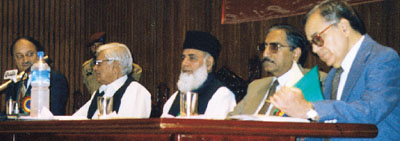With LHC increasingly a focus for world physics, distant communities become key partners in the preparations for the big experiments. In Pakistan, an annual International Summer College on Physics and Contemporary Needs provided an Asian platform for CERN physics.

The summer heat presses down relentlessly on the plains of Pakistan, but the hills overlooking the capital city of Islamabad from the north perch above the worst of the steamy blanket, and in only an hour and a half’s drive the mercury drops from 40 to 25 °C. Historically, towns in the Murree Hills have been the traditional summer retreat for local administrations, but with improved communications they now throng with plains-dwellers eager to escape the oppressive heat below.
Since 1974 the Murree Hills have also been the scene of a notable annual physics event. In Pakistani physics, the influence of the late Abdus Salam, the first Pakistani to be awarded a Nobel Prize, is everywhere. Throughout the world, Salam is remembered for his physics contributions and for founding the International Centre for Theoretical Physics in Trieste, Italy, which now bears his name. In 1974 he also suggested setting up a regular international forum in Pakistan, to attract scientists from all over the world, particularly from the developing countries. Salam knew that these scattered scientists can easily become isolated and often lack the contact so necessary to keep pace with, and contribute to, contemporary research.
The summer college was established at the leafy haven of Nathiagali (at 2600 m), the former site of the summer residence of the North West Frontier Province. More recently the College has moved to a modern tourist complex in Bhurban, overlooking the Jhelum Valley and facing the foothills of Kashmir.
The summer colleges have attracted a prestigious list of speakers, each year having special keynote topics. This year the 25th International Nathiagali Summer College on Physics and Contemporary Needs focused on three themes: high-energy physics and accelerator-driven fission in the first week; and laser cooling, quantum computing and nanotechnology during the second week. Students came from all over Pakistan and from neighbouring countries in Central Asia.

Pakistan’s increasing involvement in experimental particle physics was reflected in the lectures on high-energy physics. Presentations were given by Hafeez Hoorani of CERN on the subject of W Physics at LEP, Felicitas Pauss of ETH Zurich on Physics at the LHC, Daniel Treille of CERN on the Standard Model and Physics at LEP, Tejinder Virdee of CERN and London’s Imperial College on LHC Detectors, and Oswald Gröbner of CERN on the LHC machine.
In the lectures on accelerator-driven fusion, Jean-Pierre Revol of CERN described experiments by Carlo Rubbia’s group and spoke of future plans at CERN, while Günter Bauer and Sandro Pelloni of the Swiss PSI Institute covered accelerator-driven reactors and neutron reaction rates respectively. Giovanni Ambrosi of Geneva spoke on the AMS particle physics experiment in space, and CERN Courier editor Gordon Fraser surveyed some recent history in “Physics and the 20th century”.
Since Salam’s death in 1996, the college has featured a Salam Memorial Lecture, which this year was given by distinguished theorist Sergio Ferrara of CERN, speaking on “Superspace and supergravity the quest for unification”.
At the official inauguration of the summer college, held at the National Library in Islamabad, a new collaboration agreement was signed between CERN and Pakistan’s recently established National Centre for Physics (CERN Courier March). Pakistan’s President, Muhammad Rafiq Tarar, said he hoped that the collaboration would flourish and that such international ventures would strengthen contacts between Pakistan and the rest of the world.







